13
songs
—————-
By Beppe Colli
Oct.
20, 2014
"Food
for thought"
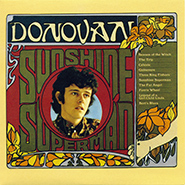
Donovan
Season Of The Witch
A masterpiece of "psychedelic folk rock" (best I can do), a kaleidoscopic album which proved to be enormously influential for a lot of music yet to come, Sunshine Superman (1966) made Donovan a superstar, and an archetype – Donovan being already a famous artist at the time, of course, but mostly for his "protest folk songs", something which had many people regard him as some kind of "Dylan-lite". While the title-track was the obvious single, and a worldwide smash, it was the songs that didn’t sound as catchy – those that nowadays would get labeled as "deep cuts" – that proved to be timeless. One of those songs, Season Of The Witch, instantly became a kind of "rock standard" – let’s not forget that it was quite common at the time, even for established groups, to record "covers" – as it’s easily proved by those versions recorded by Vanilla Fudge on their album Renaissance (1968); by Al Kooper with Stephen Stills on Side Two of the highly acclaimed Super Session album (1968); and by Julie Driscoll, Brian Auger (and his Hammond organ!), and The Trinity on their album Open (1967), Driscoll’s vocal performance being by far the most "in tune" with the spirit of the original.
"Chunky" guitars, then a bass riff full of tension and menace, the electric bass here sporting quite heavy "flatwound" strings. At first, the story has a plain tone (When I look out my window/Many sights to see//And when I look in my window/So many different people to be), which quickly turns into an agitated one – listen to the octave jump – as the narrator realizes what he’s seeing (That is strange/So strange). The "mirror" scene is one that’s impossible to forget (When I look over my shoulder/What do you think I see//Some other cat lookin’ over/His shoulder at me). Fine vocals by Donovan, whose elastic phrasing witnesses his careful listening to the "rubato" of Blues and Jazz.
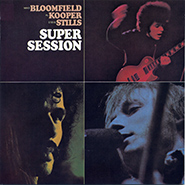
Mike Bloomfield/Al Kooper
Stop
The album that made a "format" official, the million-seller Super Session (1968) saw two very fine names of 60s US rock play together, with excellent results. Right from the start of his collaboration with Paul Butterfield, Mike Bloomfield became the most celebrated American Blues guitarist. An average instrumentalist, but one who possessed the great gift of being able to play the right motif at the right time, Al Kooper became famous all over the world when he conceived and performed the Hammond motif which is such an integral part of Bob Dylan’s worldwide hit Like A Rolling Stone (1965) – a single that at the time appeared as one that could really change the rules of the game. (Four years later Al Kooper wad featured on piano and organ on You Can’t Always Get What You Want, the closing track of the highly celebrated, and highly successful, Rolling Stones album Let It Bleed.)
A minor R&B hit by singer Howard Tate, here Stop is "sung" by two very individual "voices": Mike Bloomfield’s Gibson Les Paul, and Al Kooper’s Hammond B3. Check the organ intro, with the impossible-to-miss "percussion" effect; then the guitar solo, rich with those Bloomfield traits: the nervous vibrato, those microtonal movements, his hyperactivity, his playing "ahead of the beat"; Kooper’s solo is technically simple but practically perfect when it comes to its formal organization, making skillful use of vibrato and Leslie, hitting the highest note, then a graceful descending phrase. Great coda, too.
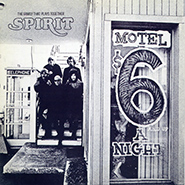
Spirit
Aren’t You Glad
At the time, it was quite common for rock groups to end their album with a long, ambitious track that could function as a kind of climax, and in this sense Aren’t You Glad – the closing track of Spirit’s second album, The Family That Plays Together (1968) – is not an exception. The song makes great use of a melodic piano riff which acts as a "hook" and as a "bridge", played with expected elegance by John Locke. The song is perfectly served by the elastic-as-usual rhythm section, by Jay Ferguson’s vocals, and by an explosive guitar performance by Randy California, who alternates those "flute-like" moments (timbrally, a Robert Fripp before his time) backed by violins, and explosions rich with expressive vibrato, plus some moments when the guitar sounds on the verge of feedback (here and there, one can also hear the sound of the pick hitting the strings).
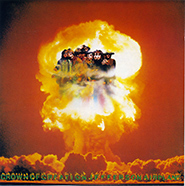
Jefferson Airplane
Lather
"At what age does one get old?" is a question that’s invested with a quite precise meaning at a time when there’s a motto which goes "Don’t trust anybody over thirty". But what happens when a "young person" becomes "old"? And when "one of us" becomes "one of them"? This is the thematic background to Lather, opening track of the album by Jefferson Airplane which for a long time was regarded as being the group’s best, Crown Of Creation (1968). While Paul Kantner, the group’s rhythm guitarist and featured singer, remained faithful to the folk idea of the "newspaper in music", and lead guitarist (and singer) Jorma Kaukonen often wrote dark apologues which told listeners of his Blues past, it was lead singer (and group "image") Grace Slick who painted the most corrosive, intellectually challenging pictures in the group repertoire. Such is the case with Lather.
Shot in a fantastic close-up inside a giant screen – here the recorded sound is quite spectacular – Grace Slick’s voice is heard singing a mournful lullaby. What will become of Lather now that he’s thirty years old? Will all his toys be taken away? Will he have to find a "regular" job like his old friends "who’d stopped being boys?". Fantastic bass performance by Jack Casady, who contributes understated tension. There’s an impossible-to-forget nose solo. Dramatic drum episodes by Spencer Dryden. Listen to the way Grace Slick sings, after a short pause, "But that’s all over". From a distance of about half a century, Grace Slick still asks a question that’s impossible to avoid.
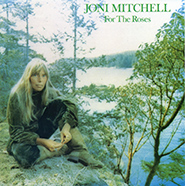
Joni Mitchell
You Turn Me On, I’m A Radio
For some time now David Geffen – the media mogul who once upon a time acted as agent, manager, founder of Asylum Records, and record company president – has said that it was with a funny tone and in a sing-along style ("I’m a country station/I’m a little bit corny") that Joni Mitchell played and sang to him her song You Turn Me On, I’m A Radio, a song which according to Geffen was composed after he pressed the singer to come up with something more commercial which could break her into the mainstream. This sounds perfectly plausible. Though it maybe really had a "mercenary" origin, the song – which proved to be Joni Mitchell’s first single which charted, and the only "light" moment of the excellent album titled For The Roses (1972) – sounds quite charming and natural, sounding fresh even today, maybe even more so, now that there’s no danger of listeners burning out from the song being perpetually placed in heavy rotation.
Acoustic guitar, harmonica (by Graham Nash), and not much else, Mitchell’s voice adopting a friendly tone, that "hook" to DJs (who loved the song, of course) and to "special requests", and those movie-like images: "If you’re lying on the beach/With the transistor going" (….) "Call me at the station/The lines are open".
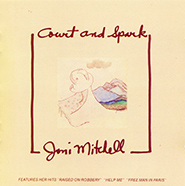
Joni Mitchell
Help Me
The album Court And Spark (1974) and those singles taken off the album, Help Me and Free Man In Paris, were Joni Mitchell’s (only) commercial high points. Though it’s quite communicative and "commercial", the album is a work of great depth which sports fine vocal performances, in a way a daring experiment for the artist. The questing, problematic nature of Mitchell’s topics stays the same. Sure, what will strike most of those who listen to Help Me is the song’s start – "Help me/I think I’m falling/In love again" – but the story has a very different ending that’s unexpected: "We love our lovin’/But not like we love our freedom". (A moral, it goes without saying, whose "practical" side is quite different at a time when the "serial monogamy" of those "happy few" not bound by society’s "old rules" is practiced on a mass scale, something to which nowadays one could add the so-called "poly-amorous" condition.)
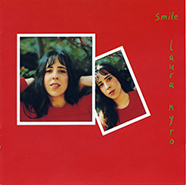
Laura Nyro
Sexy Mama
A cover of Sexy Mama – an R&B hit which had charted three years earlier as performed by The Moments – was the song chosen by Laura Nyro as the first track of Smile (1976), the album that signaled her return to the scene after an absence of five years. In a way the song acts as a kind of bridge between Smile and Gonna Take A Miracle, the album featuring covers of R&B hits and obscurities that had been the last one released by Laura Nyro before she quit. Though her vocal performances on this album are always crystal-clear, even at the most tense, dramatic moments, one cannot help but notice the cool, relaxed, inviting tone of Nyro’s vocals on this track. Acoustic guitar, electric bass, and drums – John Tropea, Will Lee, and Chris Parker – with Joe Farrel’s sax playing a coda, Sexy Mama hides Nyro’s masterful touch behind her relaxed spontaneity.
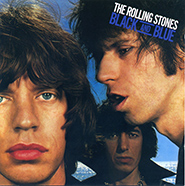
The Rolling Stones
Memory Motel
"The Rolling Stones and sex." Complex theme for sure. Once upon a time Mick Jagger always answered that he didn’t write all those lyrics, you know, and anyway they were practically adolescent, not that there was no truth in this argument – here the one that gets mentioned is always Under My Thumb, and it’s strange that not many seem to have bothered to look what’s under the accordion on Backstreet Girl (by the way: it’s Nick DeCaro). Of course one doesn’t have to forget that Jagger has always been ready to provoke controversy when he thought that the group could benefit from it – look no further than Some Girls (1978).
Memory Motel, off Black And Blue (1976), is a good example of a mature song. A country-blues, Jagger on grand piano, Richards on electric piano, Harvey Mandel on lead guitar, Jagger’s pronunciation in the first few stanzas practically challenging listeners to take his tale seriously, it’s a portrait of an independent woman (here the "bridge" sung by Richards – who appears to have written it – appears as thematically linked to Ruby Tuesday).
She’s a musician – "She took my guitar and she began to play/She sang a song to me/Stuck right in my brain" – and the song she sings to him goes like this: "You’re just a memory of a love/That used to mean so much to me". It’s a simple story, which stands a complex analysis.
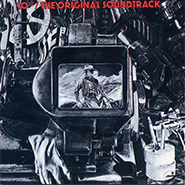
10cc
I’m Not In Love
"Why you never tell me that you love me?" "Because if I say it all the time, soon it won’t mean a thing." This, according to Eric Stewart – the main composer of the megaseller I’m Not In Love, off the 10cc album The Original Soundtrack (1975) – is the anecdote that’s at the start of this song, whose lyrics explain the reasons that prove as true what the writer would like to negate. (Still with me?) A pinch of bossa nova, done.
But not quite. Though the main contributor to the song proper was the group’s bass player – and Eric Stewart’s frequent collaborator – Graham Gouldman, it was thanks to the intervention of the group’s two "resident artists", Kevin Godley and Lol Creme, that the song became a colossal experiment in creating "avant-garde for the masses" (there’s a very fine article that appeared a few years ago in the U.K. monthly Sound On Sound, in their Classic Tracks series, which tells the whole story in great detail). An ocean of voices, a few background instruments, and a famous interlude: time stands still, there’s a bass solo, and then a female voice says: "Be quiet. Big boys don’t cry".
The song has been covered many, many times – all useless versions, of course, the only one that makes sense, of course, being the original studio creation – the original song appearing in countless movies (most recently, the soundtrack to the movie Guardians Of The Galaxy).
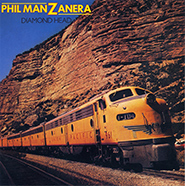
Phil Manzanera
Alma
Those who’d like to undergo a crash course about the difference between "then" and "now" can have a listen to Diamond Head (1975), the first solo album by Phil Manzanera who at the time was the guitar player in Roxy Music, and think about those blasé comments about said album – "sure, it’s good, but…", and so on and so forth. There was more than a pinch of snobbery at work here – "you know, Roxy Music…" – which anyway did not make it impossible for many to see the high quality of those contributions by musicians such as Brian Eno and Robert Wyatt – "he’s good". Fact is, the bar was set quite higher in those days. So something that sounded quite a bit Crimson-like in its metre, vocals, and Mellotron (it’s John Wetton) such as Same Time Next Week didn’t sound like much.
Closing track sung by Bill MacCormick, whom we all knew from the days of Robert Wyatt’s Matching Mole (Quiet Sun had left no recordings), Alma is a song whose melody sounds "quite English" and is performed with great feeling. Lotsa guitars in the background, three verses, one bridge, and a "fake" ending which acts as a bridge to the next section. The end is a giant fresco for guitars, a "wall of sound" with great, symphonic, bass parts (here Manzanera sits on bass), with a majestic climax that’s positively Crimson-like and an ending that’s quite moving, to say the least.
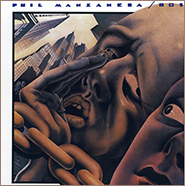
Phil Manzanera/801
Postcard Love
Brian Eno had a great part in the success of 801 Live (1976) – the first album by a "variable, loose collective" of great instrumental prowess. Then Eno appeared to lose interest, the same being true for critics, but for very different reasons: Punk had knocked on the door. And so an album such as Listen Now (1977) – the high point of a way of doing things – found tired ears. It’s an album that’s best appreciated as a whole, and which definitely repays a kind of attentive listening attitude that’s nowadays a rarity – first track combines lyrics and mood which deal with a state of Orwellian global surveillance state with a groove that’s bound to remind one of The Temptations as produced by Norman Whitfield on such tracks as Cloud Nine and Papa Was A Rolling Stone.
Postcard Love is an oasis of sad, melancholic peacefulness in the eye of drama. Very "English"-sounding melody, great guitar intro by Phil Manzanera – sounds like one is listening to the room mic only – piano, light hits from the drums (it’s Simon Phillips), a vocal performance that sounds "with feeling" but not at all rhetoric (no easy feat, this).
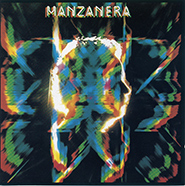
Phil Manzanera
Walking Through Heaven’s Door
K-Scope (1978) was the last chapter in the history of a great collective. Times being what they were, Roxy Music got back together, Phil Manzanera pulled the plug, game over. Less cohesive than Listen Now, K-Scope features heavy traces of irony and hysteria that give it a flavour all its own.
Walking Through Heaven’s Door is a very dramatic song, with just a few simple elements that get modeled by a highly skillful recording and mixing work for an end result that nowadays would be almost impossible to achieve. Air travel, synth arpeggios, synth bass (Moog pedals?), light, expressive comments on soprano sax (by former King Crimson Mel Collins), and Bill MacCormick’s multiple vocals which get their tri-dimensionality by via of pre-verb, pre-echo, and backward tracks. Pay attention to the pause after "This is it", followed by "Now we’re here at last", where the "impossible-sounding" "N" in "Now" communicates the dramatic tension before the landing.
There’s an abrupt change in the equalization, ghost-sounding vocals (bathed in red and yellow light), Simon Phillips’s drums offering a superb performance, MacCormick’s dry-sounding bass, Manzanera’s guitars building a wall ("We try to eat"/ta-ta-ta-ta-ta-ta), for a great 6′ 58".
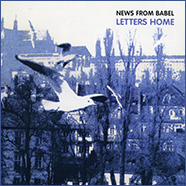
News From Babel
Who Will Accuse?
The transition from the 70s to the 80s runs parallel to the one that has "difficult music for the many" became "difficult music for the few" (who were also accused of professing "elitist tendencies", the same being said to be true for both those who played and those who simply listened). So we started to travel the desert – and we still do, by the way.
Music by Lindsay Cooper, lyrics by Chris Cutler, a very colourful instrumentation – Lindsay Cooper’s reeds and winds, Zeena Parkins’s harps and accordion – and Robert Wyatt on vocals make Letters Home (1986), the second album by the collective called News From Babel, an undisputed masterpiece.
"Who Will Accuse?", asks Wyatt’s voice. "Who will accuse us if we choose to dream/To take a world already made/To sit before a fire that warms/And not to ask who built it, or what burns?". The implication being that the choice is not available to us.
© Beppe Colli 2014
CloudsandClocks.net | Oct. 20, 2014


